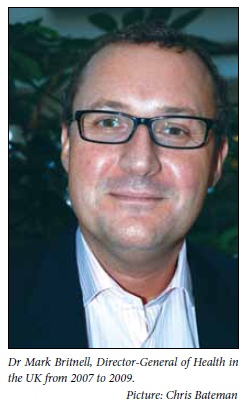Serviços Personalizados
Artigo
Indicadores
Links relacionados
-
 Citado por Google
Citado por Google -
 Similares em Google
Similares em Google
Compartilhar
SAMJ: South African Medical Journal
versão On-line ISSN 2078-5135
versão impressa ISSN 0256-9574
SAMJ, S. Afr. med. j. vol.101 no.11 Pretoria Nov. 2011
IZINDABA
Focus on the 'how' and start piloting NHI now - former UK health chief

A deeply pragmatic approach to national health insurance that favours patient choice (not ideology) and an incentivebased relationship that 'avoids treating the private sector like a one-night stand' are vital to South Africa's success, a key architect of universal health coverage in the United Kingdom says.
Dr Mark Britnell, Director-General of Health in the UK from 2007 to 2009, was speaking to private hospitals, medical aid schemes and international experts in the field at the annual conference of the (private) Hospital Association of South Africa (HASA), held on Cape Town's foreshore last month. He said Britain's NHS was the catalyst for the world's largest building programme between 2000 and 2011, sprouting 100 new hospitals, mostly through innovative long-term contracts that compensated participating private hospital groups with generous patient tariffs, initially 20% higher than usual. Suggesting that such a scheme could work well in South Africa, he said two of the UK private sector hospital chains decided 'not to play' while the other two 'got stuck into it - you can guess which ones have prospered; their tariffs eventually were reduced, but their volumes increased,' he added. Illustrating the historic scale of the infrastructural achievement, Britnell said that in 1997/98 just under half of Britain's hospital stock was built prior to World War II, while nurse and doctor vacancy rates stood at 12 - 15%. The staffing vacancy rates had since dropped to 'about two per cent'. The 'big South African debate' of whether government could trust the private sector and whether it 'wants to play ball' was rendered irrelevant in the UK - 'patients don't care who treats them now'.
Tony Blair sided with patients
Said Britnell: 'Prime Minister Tony Blair courageously took the perspective of the patient and stood to one side with them as the NHS developed. He said what matters is what works. Independent evaluations were done by the universities, beginning with electives and diagnostics and then moving to long-term conditions'. GPs were also paid 'a bit more money' to help their patients 'choose and book' (hospitals) while an independent Co-operation and Competition Commission was set up to ensure fairness between the government and private sector. 'It was deeply pragmatic, not about political ideology. Hospitals located in competitive markets began to lower their mortality rates faster from 2006 onwards as reforms moved patients to higher performing hospitals. You can't treat the private sector like a one-night stand - you have to be committed to it,' he added. The concept of 'Any Qualified Provider' (AQP) licensing qualifying institutions to provide safe care and treatment meant patients were able, via the Internet, to choose how, where and when to be treated. Patient waiting times for elective procedures dropped from 18 months in 2000 to 18 weeks currently as hospitals, monitored for quality and performance by a totally independent body, began competing. (South Africa's Office for HealthCare Standards Compliance is a government-initiated and staffed body that will ultimately report to parliament. An ombudsman office is also envisaged, but its stand-alone independence is anything but guaranteed.)
SA Treasury backs private/public partnerships
Affirming Britnell, South Africa's Deputy Director-General of Public Finance in the National Treasury, Andrew Donaldson, said much of the success of the UK's NHS financing arrangements depended on the balance between private and public support for investment.
In South Africa 'difficult choices' needed to be made on what to keep and what to discard in the system. There was major scope for public/private partnerships, especially in the construction, maintenance and equipping of facilities. However, the complexity, cost and lengthy timelines first needed to be addressed with revised contract terms of between 20 and 30 years. He also saw potential for sharing resources in medical and professional training and expanding training facilities and integrating supply chain management between the two sectors, thus lowering costs and bringing modern logistics into public sector health care delivery. Donaldson said inadequate costing systems and unresponsive procurement systems remained major public sector challenges.
Britnell said the UK's star rating system guaranteed better performing hospitals, bigger volumes and thus greater profits. Independent regulation of any universal health coverage system was vital, because if an NHS was going to set prices it could not 'mark its own homework'. Asked by HASA chairperson, Dr Nkaki Motlatla, whether he thought the 23-person South African ministerial advisory committee on the NHI compared well with its historical 40-person British equivalent which drew on external and internal wisdom, Britnell replied, 'No - though I don't know enough about the group you talk about. Sometimes you have to bring in new faces to make sure you're really changing the culture ... you need fresh blood, time and ideas, moulded with the best in South Africa's civil service.'
Respect and support your foreign doctors
In a later interview with Izindaba Britnell, currently Chairperson of KPMG's Global Healthcare Division, welcomed South Africa's phased 15-year NHI strategy, its 'brave and honest' recognition of the shortfall of medical and clinical staff and the need for 'total re-engineering'. He suggested a human resources solution in short, medium and 'tactical' terms. Tactically, he said the big question was how to use nurses and doctors in the private sector more effectively once the huge investment in primary care had begun impacting on the need for hospital care. Conceding that South Africa's 'more acute' labour shortages made direct comparisons with the UK difficult, he suggested South Africa urgently tap into countries producing doctor and nurse surpluses, such as India and Malaysia, the Asia region and some South American countries. 'The next thing is to treat them as respected guests in your own country and give them appropriate support,' he emphasised. Long-term, as in England, the expanded training of doctors and nurses needed to begin immediately, enabling sufficient production for primary care within five years. Brazil, Mexico and other comparable countries had shown that workloads could also be reduced through supervised task shifting. Britnell, who often frequents several countries in a single week, said he gauged any health care system by 'playing a simple game to see how many people I meet use the word "they" and not "I". (The former) is a classic sign of disempowerment where they believe the bureaucracy is greater than their ability to act, whereas those who use "I" have a greater sense of self-control and impact over the environment over which they work.'
Alluding back to South Africa he said much work remained undone. 'Your life expectancy is 54. With Africa growing at 4% per annum, your great continent will emerge as a global power within the next 20 years. Anybody who thinks you can get away with less infrastructure is deluded,' he said. Having read South Africa's Green Paper on NHI1 and its consultative paper on Human Resources,2 his conclusion was that 'your documents are big on talk and less on action. Why not pilot certain things sooner, rather than later? You need sufficient capacity to give people choice. The vision is fantastic, but you must be able to plan out concrete steps of action over the next five years if people's skepticism is to be turned into enthusiastic support.'
Chris Bateman
chrisb@hmpg.co.za
1. Bateman C. Vasbyt now, reap NHI dividends later - Green Paper. S Afr Med J 2011;100:688-692. [ Links ]
2. Bateman C. Denying reality no longer an option - stark HR report. S Afr Med J 2011;100:700-702. [ Links ]















